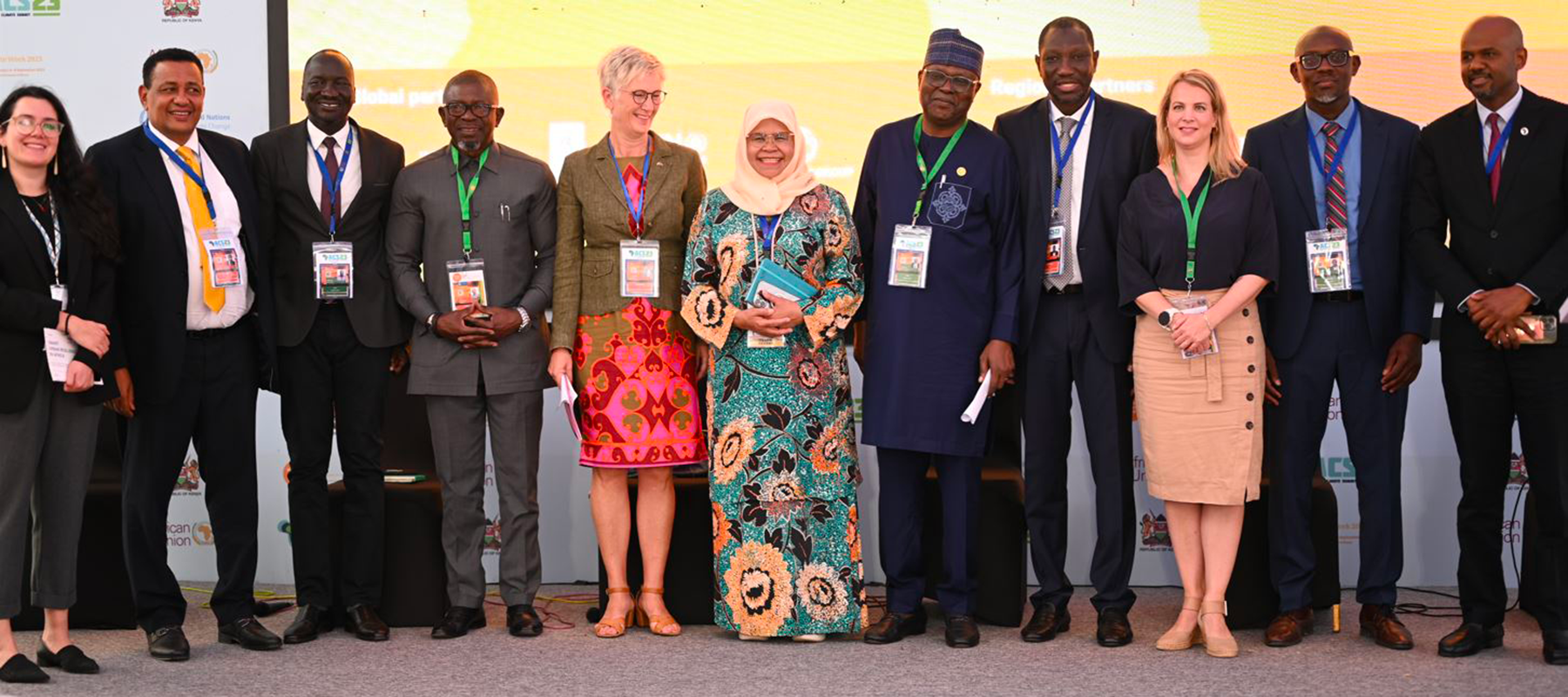High-Level Event at Africa Climate Week Calls for Urgent Action on Urban Risk Reduction and Resilience-building
September 7, 2023

From left to right: Aya Mohanna, Urban Resilience Specialist (UNDP), Zeynu Ummer, Manager (a.i.) Resilience Hub for Africa (UNDP), Gatkuoth Kai, Technical Coordinator DRR (AUC), Matthias Naab, Director Regional Service Centre for Africa (UNDP), H.E. Caroline Vicini, Swedish Ambassador to Kenya, Maimunah Mohd Sharif, Under-Secretary-General United Nations and Executive Director (UN-Habitat), Prof. Afeikhena Jerome, Special Advisor to the Commissioner of Agriculture, Rural Development, Blue Economy and Sustainable Development (AUC), Oumar Sylla, Director Regional Office for Africa (UN-Habitat), Fruzsina Straus, Human Settlements Officer (UN-Habitat), Daouda Ndiaye, Lead Climate Change Expert (IsDB), Thierno Habib Hann, CEO and Managing Director (Shelter Afrique)
A high-level event held during Africa Climate Week on 7 September 2023 called for a renewed urgency to address the challenges and impacts of urban risk in Africa. The continent is currently in the throes of a significant urban transformation, expecting a doubling of its urban population by 2050. While promising economic growth, this rapid urbanization presents substantial hurdles, including the development of sprawling urban areas, environmental degradation, rising gaps and pressure on critical infrastructure, resources, and capacities that serve the needs of growing urban populations, including refugees and internally displaced persons.
The African Union Commission (AUC), in collaboration with the United Nations Development Programme (UNDP) and the United Nations Human Settlements Programme (UN-Habitat), jointly organized the event with support from the Sahel Resilience Project and UNDP Resilience Hub. The primary aim was to explore avenues for resilient urban development, through the implementation of the AUC led Africa Urban Resilience Programme, including the targeted mechanism of a Joint Regional Programme for Smart Urban Resilience in Africa.
The event served as a platform for robust discussions and knowledge exchange on the future of urbanization in Africa, underscoring the critical need for building smart and resilient cities. Key insights from participants shed light on pressing issues:
"Reports on disasters events in Africa indicate that African cities are significantly impacted. In the light of climate change, disaster risks are high, and the consequent losses are most prevalent in urban areas," highlighted Gatkuoth Kai, Technical Coordinator, Disaster Risk Reduction Unit African Union Commission (AUC).
The challenge of informality and precarious housing accentuates disaster risk in urban areas. "The SDG 11 report tells us that 11 million people still live in slums, marking the highest rate of urbanization in Africa and Asia. This presents an opportunity for us to employ the smart urban resilience concept to transform these settlements and provide sustainable infrastructure," Maimunah Mohd Sharif, Executive Director of UN-Habitat, said.
"The progress on the Sahel Resilience Project – which supports UNDP's work with UN-Habitat in urban resilience in Africa – is noteworthy. As such, I call on other donors to partner and expand the Smart Urban Resilience Programme," emphasized Swedish Ambassador to Kenya, H.E. Caroline Vicini. "This programme brings innovation into urban planning and focuses on secondary cities, where interventions are still manageable and can have a substantial impact."
For Matthias Naab, Director of the Regional Service Centre for Africa, UNDP, "the partnerships to leverage comparative advantages from development partners for achieving a resilient future, and employing data and risk-informed analysis to enhance urban planning and support decision-making are crucial.”
“The collaborative effort involving AUC, UNDP, and UN-Habitat has demonstrated a successful concept in the Sahel region, serving as a model that can be replicated throughout the continent,” he concluded.
About the Africa Urban Resilience Programme (AURP)
The Africa Urban Resilience Programme (AURP) was developed by the African Union Commission (AUC), with the support of the Government of Sweden and the United Nations Development Programme (UNDP), through the Sahel Resilience Project. The Programme provides strategic guidance to regional economic communities, African Union Member States and other stakeholders in coordinated, multi-risk and multi-sectoral risk reduction and resilience-building efforts in African cities and urban centers, following its technical validation by AU Member States in February 2023. It aligns with and complements existing initiatives and institutional frameworks such as the Green Recovery Action Plan, the Africa Union Climate Change and Resilient Development Strategy and Action Plan (2022-2032), and the COVID-19 Recovery Framework for Africa.
About the Joint Regional Programme (JRP) on Smart Urban Resilience
Resilience has emerged as vital to sustainable urbanization, addressing multifaceted challenges across nature, economy, society, infrastructure, institutions and governance. UNDP, UN-Habitat, and the AUC have joined forces through the Joint Regional Programme on Smart Urban Resilience to offer a new generation of risk reduction and resilience-building efforts for risk-informed development in the continent. These efforts hinge on inclusive urban planning, resilient basic services and infrastructure, enhanced social cohesion, and sustainable management of ecosystems and natural resources, and are supported by people-centered emerging digital and green technologies and innovations to address urban challenges. The initiative operationalizes the Africa Urban Resilience Programme, promoting inter-sectoral coordination and advocating urban resilience among AU Member States and RECs.

 Locations
Locations



